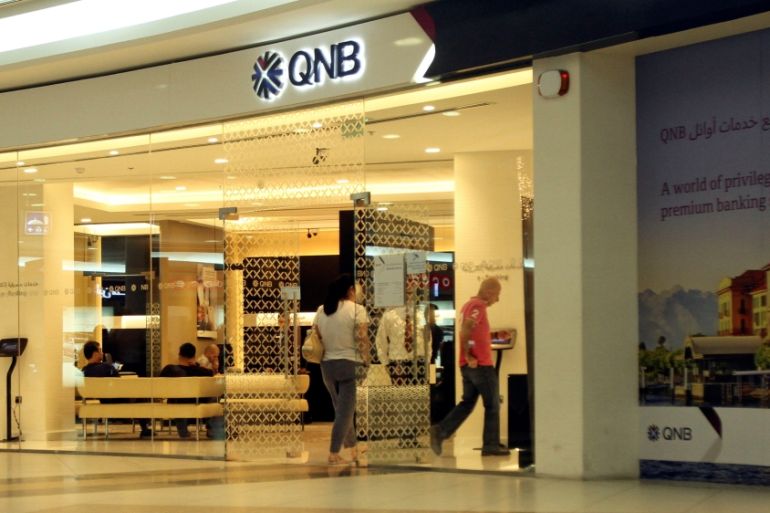Global lenders support Qatari banks hit by Gulf rift
Qatar balances out loss of funding from neighbours by securing cash from US, European and Asian banks.

A few large Asian, European and US banks are providing funds to help to keep Qatari banks running smoothly after a rift has dried up financing from the UAE, Bahrain and Saudi Arabia, according to banking sources.
|
|
“We’re unscathed so far,” one Qatari banker told Reuters news agency on Thursday.
Keep reading
list of 4 items‘We need you’: Solomon Islands’ support for US agency’s return revealed
Why are nations racing to buy weapons?
Parallel economy: How Russia is defying the West’s boycott
“The panic has eased as we’ve been able to continue receiving funding, though there’s certainly no complacency about the risks that remain.”
He said his bank had borrowed more than $100m in unsecured three-year financing from a European bank and obtained six-month deposits from Asian and European banks in the two weeks since the crisis erupted.
US banks were still trading through bilateral and repo lines, he said.
Qatar central bank governor Sheikh Abdullah bin Saud al-Thani referred to such ties in a statement this week, saying Qatari banks’ presence in markets including Asia and Europe were helping them to continue operating.
Reliance on GCC
Qatari banks’ reliance on Gulf Cooperation Council funding varies widely.
Qatar National Bank on Wednesday reported healthy liquidity position, saying: “The group manages its liquidity very wisely and benefits from a diversified local and international funding base holding a global footprint across Europe, Asia, and MEA [Middle East, Africa], with a very minimal funding from the GCC markets.”
Qatar Islamic Bank is the most dependent, obtaining 24 percent of its funding and 24 percent of deposits from the rest of the GCC, according to research published by Goldman Sachs.
Big international banks including HSBC, Citigroup, Deutsche Bank and JPMorgan declined to comment, Reuters said.
In a statement, Standard Chartered said its operations in Qatar were unchanged, but it did not elaborate.
Another difficulty facing those doing business with Qatar now is logistical, an international banker said.
He said flying physical documentation for trade finance deals to Qatar has become slower and more burdensome as direct flights from Dubai have been cancelled because of the diplomatic rift.
READ MORE – Qatar-Gulf crisis: All the latest updates
International banks’ ability to keep doing business with Qatar could face hurdles if the Saudi and UAE central banks were to announced harsher sanctions, such as curbs on the ownership of Qatari assets. So far, there appears to be no sign of that happening.
“If the sanctions had been proposed by the United Nations, we would have frozen everything, but because this is from one country to another, we don’t see any reason to freeze anything,” a source at an Asian bank said.
Another potential risk is that Saudi Arabia could try to push international banks to choose between doing business with Qatar and obtaining access to its own, much larger market. But this would be difficult to enforce.
In the meantime, the premiums which Qatari banks are paying to fund themselves do not look crippling.
The three-month Qatar interbank offered rate has risen to a multi-year high of 2.31 percent from 1.92 percent before sanctions were imposed.
Some Qatari banks are paying as much as 50 to 100 basis points more than they used to in the interbank market, an Omani banker said.
But the Qatari banker said the six-month deposits his bank secured in the past few days only involved a premium of 1 basis point.
|
|